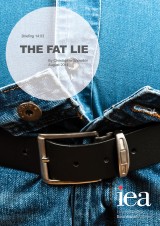The fat lie: Britain's rising obesity unmasked
Conducted by the Institute of Economic Affairs (IEA), the briefing paper argues against the claim that calorie consumption has been the primary cause of the UK’s expanding waistline. Indeed, according to the IEA the evidence overwhelmingly suggests that per capita consumption of sugar, fat and calories has been falling in the UK for several decades.
The Fat Lie examines evidence from the Department for Environment, Food and Rural Affairs, the National Diet and Nutrition Survey, the ONS and the British Heart Foundation.
The average weight of an English adult has increased by two kilograms since 2002. Yet over the same period calorie consumption fell four per cent and sugar consumption dropped nearly 7.5 per cent. The amount of calories consumed outside the home also tumbled from 310 in 2001/02 to 219 in 2012.
But while Brits were cutting back on cake, physical activity has also taken a back seat. In 2010 the average Brit walked 179 miles – compared with 255 miles in 1976.
Cycling had also dropped to an average of 42 miles a year by 2010, compared with 51 in 1976.
As many as 40 per cent of people reported spending no time walking at work. The IEA points out that the rise in sedentary office jobs and labour-saving devices mean people are not compelled to undertake the same amount of physical activity they used to.
Report author Christopher Snowdon said: “With obesity now featuring so heavily in the media it is worrying that so few people know that our largely sedentary lifestyles, not our appetites, have been the driving force behind the UK’s expanding waistlines”.
The report draws three key findings from the evidence gathered, the first being that the food industry, which has been the target of increasingly polemical public health campaigns, is not the main culprit for rising obesity. It could also put paid to some campaigners who argue that bans and taxes on certain types of food and drink could significantly reduce obesity numbers.
Second, while people tend to play fast and loose with the amount they say they eat, it remains “extremely unlikely” that the almost uninterrupted fall in calorie consumption is down to people telling fibs about how much they eat.
Furthermore, the report argues a one-size-fits-all solution is inadequate when it comes to reducing obesity. The report acknowledges while average calorie consumption has fallen this does not mean everyone is eating less; however, the IEA urges scepticism about claims that cutting the UK’s calorie intake will reverse the rise in obesity.
Please read the full article here.
.
 Education not tax, Ineffective consumer behaviour, Ineffective on obesity, Taxes unfair, What others say: experts, What others say: media, Behavioural taxation, IEA, Institute for Economic Affairs, Obesity, Physical activity, The fat lie, United Kingdom
Education not tax, Ineffective consumer behaviour, Ineffective on obesity, Taxes unfair, What others say: experts, What others say: media, Behavioural taxation, IEA, Institute for Economic Affairs, Obesity, Physical activity, The fat lie, United Kingdom